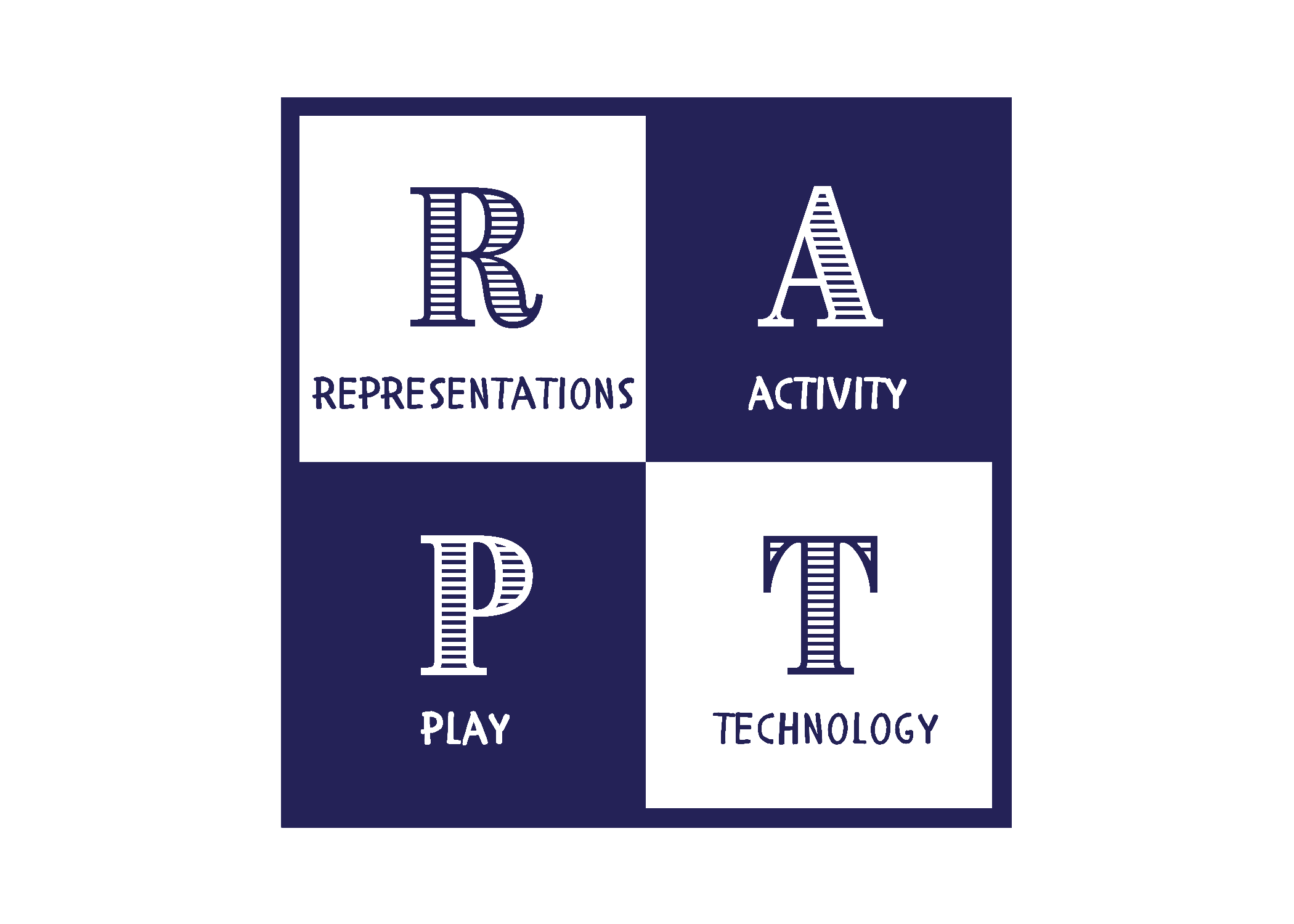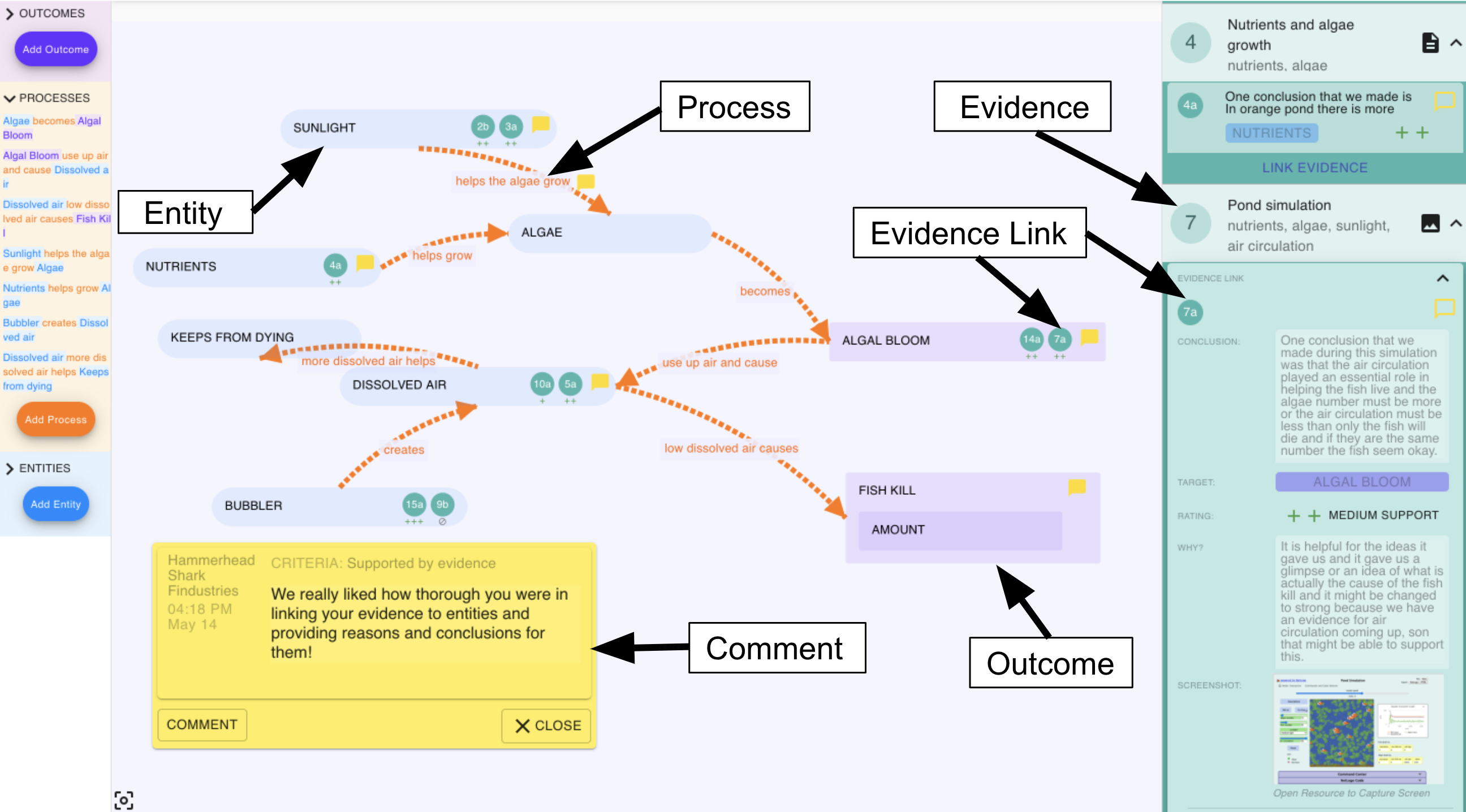
RAPT Lab: Representations, Activity, Play, and Technology Lab
Projects: Scaffolding Explanations and Epistemic Development for Systems (SEEDS)
In the Scaffolding Explanations and Epistemic Development for Systems (SEEDS) project, we are exploring how elementary students (5th grade) think about different kinds of evidence as important for helping them create and revise models of scientific phenomena. To study this, we developed the Model and Evidence Mapping Environment (MEME).
The Modeling and Evidence Mapping Environment (MEME) was developed to help users build qualitative models of scientific phenomena, and revise those models based on evidence.
MEME is modeled after a number of previously succesful approaches to helping students represent their emergent ideas, such as concept mapping. However, we have added 3 key sets of features that we believe set MEME apart, while supporting our research into how students develop and refine scientific models:
- Evidence Links: MEME included a built-in resource library so that users can identify evidence for or against a portion of their model, link it directly to their model, and explain how it fits (or does not).
- Systems Thinking: MEME is organized around what we know about systems thinking, building on the The Phenomenon-Mechanism-Components (PMC) Framework (Hmelo-Silver et al., 2017). This framework focuses on how a system can be viewed from multiple interacting levels at once, from the superficial components, starting with the superficial components within the system, which interact through a range of mechanisms, which produce the observable phenomenon of interest. In MEME, each model represents a phenomenon, and is built up of entities and processes (we found students viewed these terms as more intuitive). We also added distinct observable “outcomes” to the modeling environment as learners appeared interested in representing these explicitly (Danish et al., 2021).
- Integrated communication and feedback: To support students in discussing, critiquing, and revising their models, MEME includes a commenting feature that allows instructors and peers to offer feedback on each model. In addition, these comments are organized around collective criteria that users can develop around what makes for a good model (Murphy et al., 2021).
We have been exploring students’ use of MEME as part of the NSF-funded Scaffolding Explanations and Epistemic Development for Systems (SEEDS) research project. Our goal in this project is to explore how students think about different kinds of evidence, and how they use evidence to evaluate or refine their scientific models—key practices for engaging in constructing scientific knowledge.
Context of Use
Meme was originally developed for use in 5th grade science classrooms where students used it to explore eutrophication (Danish et al., 2021). You can see more about this in our resources page. However, we have also used it in grduate seminars, undergraduate courses, and to support our design efforts as we attempt to develop Design Based Research (DBR) conjectures and plan our next study. In short, we think it can be helpful in any context where it is useful to collaboratively develop a model, particularly if you wish to link that model to evidence or other resources.
Funding for the the iterations of the SEEDS Project
| Grant Name | Funding Agency | Grant Number | Co-PIs |
|---|---|---|---|
| DRL: Collaborative Research: Engaging students in discourse about criteria for judging scientific models | NSF | 2300832 & 2300831 | Ravit Duncan, Joshua Danish, Cindy Hmelo-Silver, Clark Chinn |
| DRL: Collaborative Research: Scaffolding Explanations and Epistemic Development for Systems | NSF | 1761019 & 1760909 | Joshua Danish, Cindy Hmelo-Silver, Ravit Duncan, Clark Chinn |
Publications on the SEEDS Project
2025
- Murphy, D., Duncan, R. G., Chinn, C. A., Danish, J., Hmelo Silver, C. E., Zhou, J., & Ryan, Z. (2025). Elementary Students’ Metacognitive Knowledge of Epistemic Criteria. Journal of Research in Science Teaching, tea.22030. paper
- Zhou, J., Lin, Q., Hmelo-Silver, C.E., Danish, J., Duncan, R. G., Chinn, C. A., & Desai, A. (2025). Friendly controversy: Synergistic scaffolding for practices of providing peer critique. Proceedings of the 18th International Conference on Computer-Supported Collaborative Learning – CSCL 2025. Helsinki, Finland: International Society of Learning Sciences.
- Zhou, J., Lin, Q., Ryan, Z., Hmelo-Silver, C.E., Danish, J., Duncan, R. G., & Chinn, C. A. (2025). Fostering students’ understanding of ecosystems and metamodeling knowledge. National Association for Research in Science Teaching Annual Conference 2025. National Harbor, MD.
2024
- Murphy, D., Duncan, R. G., Chinn, C. A., Danish, J., Hmelo-Silver, C. E., Zhou, J., Ryan, Z. & Stiso, C. (2024). Students’ commitment to the criterion evidential fit when evaluating the accuracy of scientific models. Proceedings of the 18th International Conference of the Learning Sciences – ICLS 2024. Buffalo, USA: International Society of the Learning Sciences.
- Schunn, C., Noroozi, O., Chen, W., Lyu, Q., Chai, S. C., Li, X., Walker, J., Reza, S. M., Acquah, A., Scarola, A., Barany, A., Henderson, J. B., Stoler, A., Manz, E., Zhou, J. (co-chair), Hmelo-Silver, C. E., Murphy, D. (co-chair), Ryan, Z., Stiso, C., Lin, Q., Danish, J., Duncan, R., Chinn, A. C., & Herrenkohl, L. R. (2024) Perspectives from the field: Scaffolding peer critique and feedback. Proceedings of the 17th International Conference on Computer-Supported Collaborative Learning – CSCL 2024. Buffalo, USA: International Society of Learning Sciences. paper
- Zhou, J., Albert, L., Hmelo-Silver, C.E., Danish, J., Ryan, Z., Stiso, C., Murphy, D., Duncan, R. G., Chinn, C. A., & Lin, Q. (2024). Scaffolding students’ adoption of norms for peer critique. Proceedings of the 17th International Conference on Computer-Supported Collaborative Learning – CSCL 2024. Buffalo, USA: International Society of Learning Sciences. paper
- Zhou, J., Hmelo-Silver, C. E., Ryan, Z., Stiso, C., Murphy, D., Danish, J., Chinn, C. A., & Duncan, R. G. (2024). Disagreeing softly: Supporting students in managing disagreement in peer critique. International Journal of Computer-Supported Collaborative Learning. paper
- Zhou, J., Murphy, D., Danish, J., Hmelo-Silver, C.E., Duncan, R. G., Chinn, C. A., Ryan, Z., Stiso, C., & Albert, L. (2024). Supporting students’ grasp of evidence interpretation to determine model validity through peer critique. Paper presented at the Annual Meeting of the American Educational Research Association, Philadelphia, PA.
2023
- Murphy, D., Duncan, R. G., Chinn, C. A., Danish, J., Hmelo-Silver, C. E., Ryan, Z., Zhou, J., & Stiso, C. (2023). Supporting students’ epistemic agency to revise a class criteria list for scientific models. Proceedings of the 17th International Conference of the Learning Sciences – ICLS 2023. International Society of the Learning Sciences. paper
- Ryan, Z., Danish, J., Zhou, J., Stiso, C., Murphy, D., Duncan, R., Chinn, C., & Hmelo-Silver, C. E. (2023). Investigating students’ development of mechanistic reasoning in modeling complex aquatic ecosystems. Frontiers in Education, 8. paper
- Zhou, J., Ryan, Z., Hmelo-Silver, C. E., Danish, J., Cruz Gonzalez, C., Stiso, C., Duncan, R. G., Chinn, C. A., & Murphy, D. (2023). Students’ use of criteria for what counts as good models. Poster presented at the 2023 Annual Meeting of the American Educational Research Association, Chicago, IL.
2022
- Hussain-Abidi, H., Smithen, B., Stiso, C., Winchester, E., Murphy, D., Chinn, C.A., Duncan, R. G., Danish, J.A., Hmelo-Silver, C. E., Ryan, Z. D. & Zhou, J. (2022). Coordinating empirical and simulation evidence during model-building in elementary science. Paper presented at the Annual Meeting of the American Educational Research Association, San Diego, CA.
- Murphy, D., Chinn, C.A., Duncan, R. G., Danish, J.A., Hmelo-Silver, C. E., Ryan, Z. D., Zhou, J. & Stiso, C. (2022). Students’ ideas about evidentiary fit and its role in modeling practice. Proceedings of the 16th International Conference of the Learning Sciences – ICLS 2022. Hiroshima, Japan: International Society of Learning Sciences. [ICLS Naomi Miyake Best Student Paper Award]. paper
- Zhou, J., Hmelo-Silver, C. E., Danish, J., Ryan, Z., Stiso, C., Cruz Gonzalez, C., Duncan, R. G., Chinn, C. A., & Murphy D. (2022). Mediating students’ scientific argumentation to support model revision. Proceedings of the 15th International Conference on Computer-Supported Collaborative Learning – CSCL 2022 (pp. 107-114). Hiroshima, Japan: International Society of Learning Sciences. paper
- Zhou, J., Hmelo-Silver, C.E., Danish, J., Duncan, R. G., Chinn, C. A., Ryan, Z., Stiso, C., Gonzalez, C., & Murphy, D. (2022). Disagreeing softly: Discursive norms for addressing peer feedback. Paper presented at the Earli SIG20-26 2022 Conference, Utrecht.
- Zhou, J., Hmelo-Silver, C.E., Danish, J., Ryan, Z., Stiso, C., Duncan, R. G., Chinn, C. A. & Murphy, D. (2022). Mediating scientific argumentation when students engage in modeling in small groups. Paper presented at the Annual Meeting of the American Educational Research Association, San Diego, CA.
- Zhou, J., Hmelo-Silver, C.E., Danish, J., Ryan, Z., Stiso, C., Duncan, R. G., Chinn, C. A. & Murphy, D. (April 2022). Mediating scientific argumentation when students engage in modeling in small groups. Paper presented at the Annual Meeting of the American Educational Research Association, San Diego, CA.
2021
- Danish, J., Duncan, R., Hmelo-Silver, C., Chinn, C., Vickery, M., Ryan, Z., Stiso, C., Murphy, D., Zhou, J. (2021). Interactive Demo of the Modeling and Evidence Mapping Environment (MEME) for Supporting both Elementary and Graduate Students. Paper presented at the 2021 Annual Meeting of the International Society of the Learning Sciences (ISLS).
- Danish, J., Vickery, M., Duncan, R., Ryan, Z., Stiso, C., Zhou, J. Moreland, M., Stiso, C., Hmelo-Silver, C., Chinn, C. (2021). Scientific Model Evaluation During a Gallery Walk. Paper presented at the Annual Meeting of the American Educational Research Association, Online.
- Danish, J., Vickery, M., Duncan, R., Ryan, Z., Stiso, C., Zhou, J., Murphy, D., Hmelo-Silver, C., Chinn, C. (2021). Scientific Model Evaluation During a Gallery Walk. Paper presented at the 2021 Annual Meeting of the International Society of the Learning Sciences (ISLS). poster abstract slides
- Murphy, D., Duncan, R., Chinn, C., Danish, J., Hmelo-Silver, C., Ryan, Z., Morgan, V., Stiso, C. (2021). Students’ Justifications for Epistemic Criteria for Good Scientific Models. Paper presented at the 2021 Annual Meeting of the International Society of the Learning Sciences (ISLS). paper
- Ryan, Z., Danish, J., & Hmelo-Silver, C. (2021). Understanding Students’ RePresentation of Mechanism through Modeling Complex Aquatic Ecosystems. Paper presented at the 2021 Annual Meeting of the International Society of the Learning Sciences (ISLS). paper
2020
- Danish, J., Moreland, M., Ryan, Z. D., Hmelo-Silver, C. E., Chinn, C. A., Duncan, R. G., & Av-Shalom, N. a. Y. (2020). Designing to Support Iterative Model Revision From Simulation and Research Evidence. Paper presented at the 2020 Annual Meeting of the American Educational Research Association (AERA), San Francisco, CA (Conference cancelled due to COVID-19).
- Moreland, M., Vickery, M., Ryan, Z., Murphy, D., Av-Shalom, N., Hmelo-Silver, C. E., Danish, J., Duncan, R., & Chinn, C. (2020). Representing Modeling Relationships in Systems: Student Use of Arrows. In Gresalfi, M. and Horn, I. S. (Eds.), The Interdisciplinarity of the Learning Sciences, 14th International Conference of the Learning Sciences (ICLS) 2020, Volume 3 (pp. 1773-1774). Nashville, Tennessee: International Society of the Learning Sciences. poster summary

